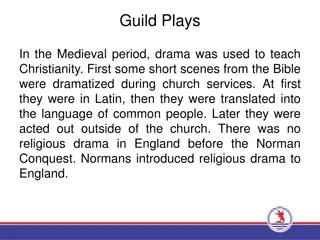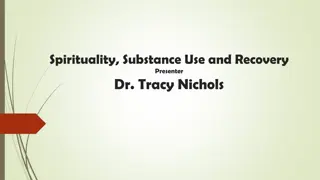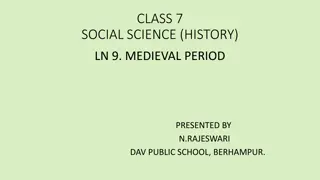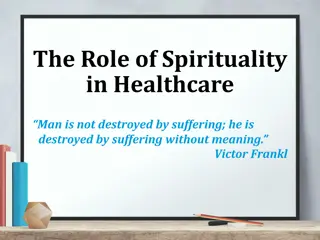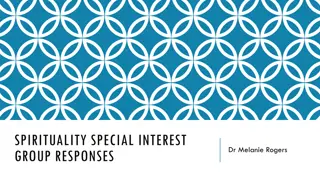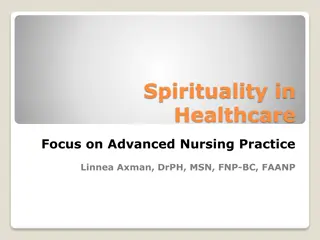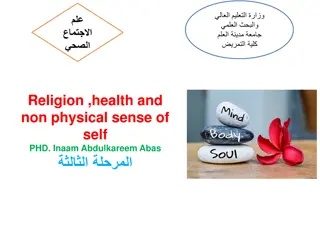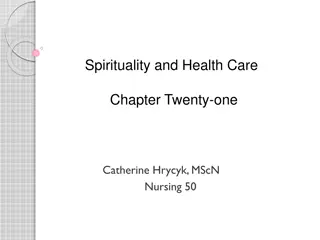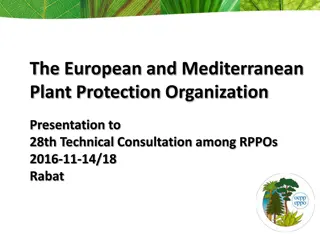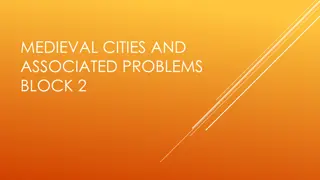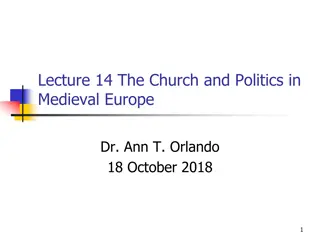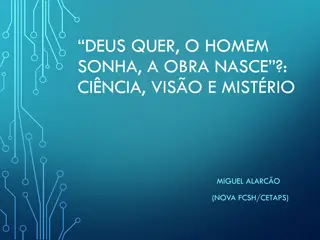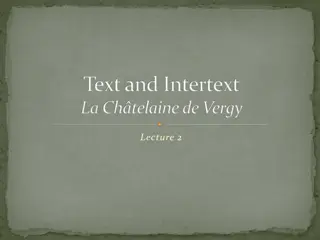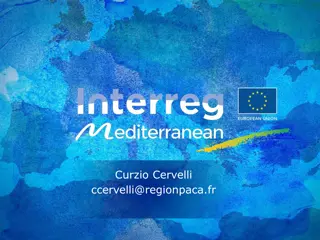Exploring Spirituality and Special Needs in Medieval Mediterranean Europe
Spirituality plays a vital role in human development, encompassing both religious and non-material aspects. This study delves into how pastoral care in the Church embraces children with disabilities, exploring dignity in Christianity and the role of family in nurturing young individuals with specialized needs. The discussion also delves into the definitions and categories of special needs and disabilities in modern society, shedding light on the diverse challenges faced by individuals with impairments.
Download Presentation

Please find below an Image/Link to download the presentation.
The content on the website is provided AS IS for your information and personal use only. It may not be sold, licensed, or shared on other websites without obtaining consent from the author. Download presentation by click this link. If you encounter any issues during the download, it is possible that the publisher has removed the file from their server.
E N D
Presentation Transcript
E020 DOCTORADO EN TRANSFERENCIAS INTERCULTURALES E HIST RICAS EN LA EUROPA MEDIEVAL MEDITERR NEA SPIRITUALITY OF PEOPLE WITH SPECIAL NEEDS CONFERENCE JULY 2024 CHRISTOS ILIADIS PHD CANDIDATE AT THE UNIVERSITY OF ALICANTE
INTRODUCTION Spirituality is a neuralgic aspect of human being. The meaning spirituality can be divided into two categories. The first and massive one is from religious point of view, and the second one is from the family, educational and academic aspect. Non-material constitutes an extremely crucial factor to the growth and development of children due to the fact that, is the most significant substance of people s life. Having in mind the first and most important category of spirituality, will be displayed how pastoral care of Church embraces children with disabilities and deafness. Moreover, will be explored the meaning of dignity in Christianity, references in Holy Bible will be underlined about these group of people and how Jesus Christ is an exemplar in ministry of people with disabilities in general. As a result of the second category of spirituality, will be presented the role, the perception and spirituality of family in the cultivation of youngsters who receive specialized support and also the part of special education in seeking to identify the particular spiritual needs which emerged and how interference by specialists could fulfill them. 2
DISABILITIES OR SPECIAL NEEDS The diversity of modern society is seen at various levels of social action and life. It is not only the different races, the gender, the religion, financial situation, profession, that sets people apart and makes them unique, but also physical condition, illness, disability. Even though, children with disabilities are minority in society, in essence they are sensitive and remarkable part of it. December 3rd of each year has been designated as World People's Day with Disability. Gatherings are taking place, a lot is being written about rights of these people who have previously been described as "People with special educational needs", "people with special needs", "people with disabilities". 3
DEFINITIONS The terms "special needs" or "disabilities" are an umbrella terms for a wide array of diagnoses. Disability is an incurable functional impairment that is congenital or occurs later in child s life and somehow prevents the fulfillment of some basic needs. According to the World Health Organization, the words "impairment" and "disability" are defined as: Impairment: Any loss or abnormality phycological, physiological or anatomical structure or function . Disability: Any restriction or lack of (as a result of impairment) ability to perform an activity in the manner or within the spectrum of activities, which considered as normal for a human being . 4
CATEGORIES People with special needs or disabilities may be concluded: People who are blind or with partial vision. People with learning or mental disabilities. People with deafness or hearing problems. People with physical disabilities. People with long-term illnesses. People with mental problems or phycological difficulties. People with acquired brain damage. 5
DEAFNESS Hearing is vital for every living being. In humans, hearing is connected to many factors such as speech, formation of language and externalization of thoughts and emotions. In animals especially, hearing is crucial for their survival and facilitate their orientation through sound signals. Vision and hearing are probably the most senses due to the fact that, living creatures realize better the world and life in general. The first sound stimulus is received at the fetal age and is completed at the childhood. Hearing is a sense of paramount importance in order to flourish speech, communication and learning. 6
CAUSES OF DEAFNESS Prenatal Period Genetic factors: hereditary and non-hereditary hearing loss Intrauterine infections, such as rubella and cytomegalovirus infection Perinatal Period Lack of oxygen at birth time Severe jaundice in the neonatal period Low-birth weight Childhood and adolescence Chronic ear infections Fluid in the ear Meningitis 7
CAUSES OF DEAFNESS Adulthood Chronic diseases Smoking Sensorineural degeneration Sudden sensorineural hearing loss Factors across lifetime Impacted ear wax Damage to the head or ear Loud sounds Ototoxic medicines or chemicals Nutritional deficiencies Infections and other ear conditions 8
PASTORAL CARE In the rich Greek language, the word shepherd ("pemenas" called in Greek), where pastoral ("pemanteke" called in Greek) origins, is synonymous with the word herdsman. God in Old Testament wishes to offer shepherds to His people to catechize them. It is concluded that pastoral is not a simple ecclesiastical case but is science. As a result, pastoral is "art of arts and science of sciences", in order to introduce the man in Church and lead him to the Kingdom of God. Jesus Christ calls all humans, without restrictions and criteria. Church embraces people with disabilities and deafness. By doing this, helps them feel that they belong to the Body of Christ, where all His members are dignified and precious. Church s care for all these people is a consequence of not only the holy perception about the sacredness and dignity of human being, but also of the effort to emulate the model of Church s founder Jesus Christ, in the ministry of the faithful who are the members of His Body. 9
DIGNITY IN CHRISTIANITY The word 'dignity' is not a theological term. It is more philosophical or legal term. On the other hand, the content of this term, by meaning the unique value that characterizes humans is accepted by Church as a basic teaching. In other words, Church teaches us that every single individual is a sanctuary and decent being. According to Holy Scripts, human is the reason why the world created by God. The cornerstone of Christian anthropology is that man created from soil and water by God and then He gave him, His vitalized breath. The incarnation of the Son of God, His crucifixion, His death and His Holy Rise give to human being value and dignity. To every single human without any separation if someone is young or old, rich or poor, having any kind of disability or not. From the first human who lived in this world until the last ones. 10
CHURCH AND PEOPLE WITH SPECIAL NEEDS The contact between Church and children with disabilities and deafness in their early ages becomes through their parents. Afterwards, when youths grow up and start to realize as much as possible their condition, Church should have a direct relationship with them. This contact could become through specialized people like phycologists, special education needs teachers and volunteers who can cooperate with priests in order to support and embrace these children and show them the truly love which represents God s love. 11
FAMILY AND SPIRITUALITY Spirituality and/or religiosity are/is an existing part of soul for a child with disabilities or deafness, a long time before he seeks that dimension. Families with children with special needs usually inform that their faith is the most significant factor regarding of their decisions for issues which concern about individuals with difficulties (Blanks & Smith, 2009; Speraw, 2006). There are humans who interpret that the experience of growing a child with disabilities is a chance for spiritual development. Like a blessing (Luther, 2012) or a challenge (Blanks & Smith, 2009). 12
SPIRITUALITY AND SPECIAL EDUCATION Melinda Jones Ault (2010) refers that spirituality is not an object that special educators traditionally have served. Their basic target is to supply special services to individuals in order to any kind of disabilities or difficulties can be managed by them. Thus, the specialized training of special educators can contribute significantly to improving of supplied services like special education, occupational therapy, speech therapy to the direction of searching the meaning of faith and spiritual experiences. It is a conclusion that spirituality is not an abaton experience for children with any kind of disabilities or deafness. Instead, the restrictions that may live youngsters regarding of non-material experiences are result of deeply rooted sociocultural perceptions, which maintain and perpetuate exclusion practices. 13
SPIRITUAL DIMENSION OF EDUCATION Professionals who work which children, rarely dare to follow strategies in order to acknowledge and manage with awareness, the spiritual dimension of education. This happens, due to the fact that educators feel the sense of uncertainty of what is spirituality, how it evolves, how could it fit with education and how could it differ with children with disabilities or deafness. In addition, a confusion or roles emerges because other departments are also involved except form educators, such as mental health professionals, psychologists and occupational therapists. 14
REFERENCES Ault, M. J. (2010). Inclusion of religion and spirituality in the special education literature. Journal of Special Education, pp. 176 189. Benson, P. L., Roehlkepartain, E. C., & Rude, S. P. (2003). Spiritual development in childhood and adolescence: Toward a field of enquiry. Applied Developmental Science, pp. 205 213. Jung, C. G. (1970a). Psychology and religion: West and East. The collected works of Carl G. Jung, vol. 11, Bollingen Series XX. Princeton University Press. Marschark, M. (1993). Psychological Development of Deaf Children, Oxford University Press, New York Oxford. Potter, D. C. (2002). Spirituality and people with learning disabilities. Tizard Learning Disability Review, pp. 36 38. 15



